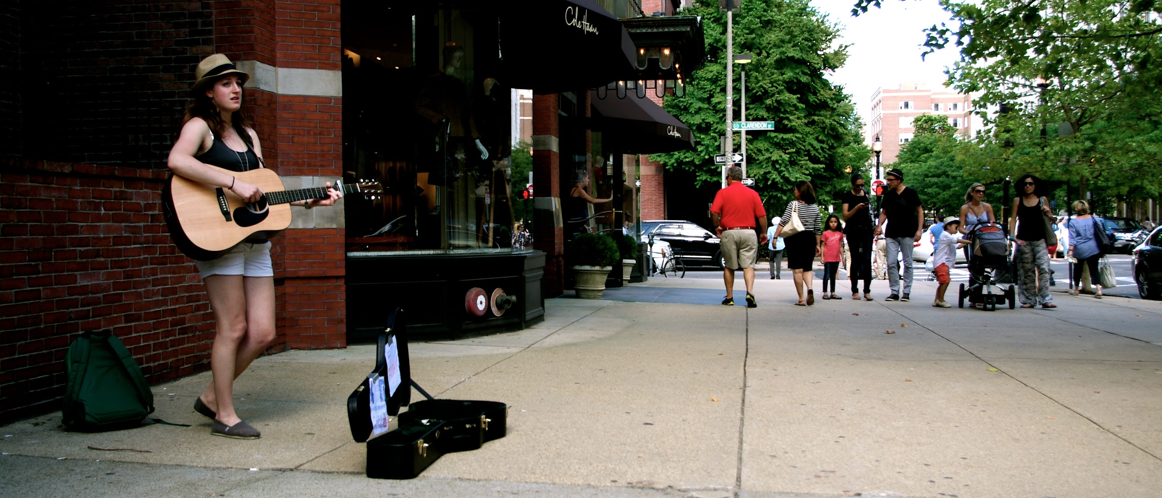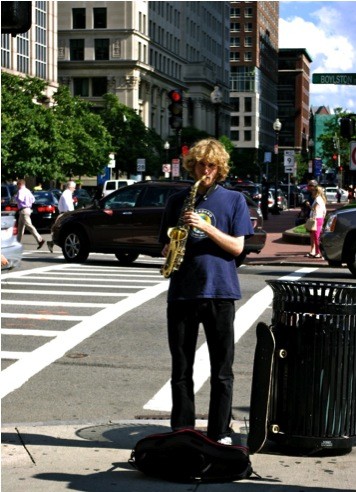A few weeks ago I had the privilege of speaking to a few talented musicians that have been out playing on the streets of Back Bay Boston. The art of busking dates back to before the middle ages, people have performed on the streets in some form or another in every country in the world. For many Boston musicians, especially students, it is a fantastic way to make some money, but for others there is a little more to it. Carl Catron, is a saxophone player, who spent three or four years at Berklee, before having to drop out due to a tonsillectomy. Despite this he plays every weekend, Friday through Sunday, outside of Daisy Buchanan’s on Newbury Street with a few other Berklee alum.
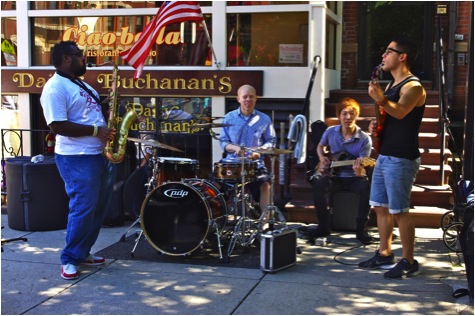
Carl’s group began busking in 2002 after the Tsunami in Japan, to raise money for the victims. Carl and several other musicians met in the Boston Commons, their performance raised $8,500 in one week. Since then Carl has been a dedicated street performer, gaining exposure for himself and the musicians who play with him. I only spoke with Carl for a few minutes but in that small span of time he managed to completely change my opinion of busking.
“Motivation for doing it, [street performance], is bringing music to people who normally wouldn’t hear it. Once people get into their thirties typically they stop going to clubs as much, especially when they have kids. Then you have homeless people who will never get to go to concerts. They can’t go in, nobody’s letting them in even if they had the money if they look homeless they’re not in.”
Although some may see street performers as an invasion of their peacefull mid-day walk, for others it’s a treat that they may not otherwise get. Busking brings free Live music to everyone no matter who they are or how much money they have in their pockets, although donations keep these talented musicians returning to the streets!
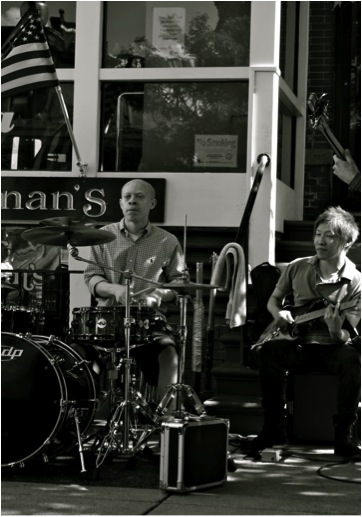
Summer is the perfect time to be busking in Boston, the weather is warm and everyone is out and about on the streets. It’s also a great way to bring some attention to your music. After watching for a few minutes two men approached Carl during a break between songs, later I learned they had asked Carl to bring his band to perform at a bachelor party the two men were attending later that day. They offered to pay him for the time he played and just like that his band had another gig.
“It’s a good way to get honest feed back on sound.” Carl tells me “As opposed to a concert where everybody who’s there for the most part has paid to see you so they already know about you, they’re already your fans, they already know about your music, they’ve already invested in you before you play a note. Whereas here, you’re getting honest feedback on how well you’re doing on each and every song by the reaction you’re getting from the crowd of people that don’t know you at all. So they owe you nothing. It’s an honest representation of what you are doing musically. It allows us to know what we need to improve upon or what we can make better.”
According to Carl musicians get a lot of stick for playing on the streets, he says “People critisize, a lot of musicians will walk by and they’ll see us and they’ll either look down on us cause you know, oh these guys are playing on the street, one side is like these guys are wasting their talent, or one side is like these guys must not be that talented. And the truth of the matter is playing on the street has gotten me many more oppertunites than playing in a club has.”
But there are a few snags to playing on the street Carl tells me “The key thing though is when you’re out here you can’t just be good, you do need to be great.” He makes a strong point, because of all the music schools around the area there are many other talented musicians trying just as hard to get the same opportunities. Carl goes on to say,
“If you want to get money and you wanna get noticed you do have to bring a certain level of excellence. That’s what I require of the people who play with me so if you notice you’ll always see me, but you always see different people with me cause it depends, like this bass player is playing Friday, there’ll be another bass player Saturday, and another bass player Sunday… We have fifty songs and we run them like crazy and make sure they’re well rehearsed so when we come out here and play for the people we’re bringing them the best music they’ve ever heard.”
Carl also gave me some useful knowlegde about the laws surrounding street performance in Boston, in the city of Boston no permit is needed to play on the street. To play in Cambridge you must pay $40 per band member, this permit will last the calendar year, so buying a permit in September, it would only last until December. Unlike Cambridge, as long as you are on public property in Boston you are able to play for free, this includes places like the Boston Commons, the Boston Public Library, in front of Trinity Church, and the Copley Square area.
Carl suggests a good way to find a space for you or your band to busk is by bringing a local restaurant or store a demo and asking if they will allow you to play in front of their building. This is the type of agreement that Carl and his band has with Daisy Buchanan’s on Newbury, it brings the bar business and it gains exposure for Carl and the other musicians in his entourage. Carl will soon be moving to Los Angeles to continue his successful performance career where he can play on the streets all year round.

Boston’s music scene drives all sorts of performers to its streets, not just big bands but also solo artists like Molly Brule from Willmington Massachusetts. Molly tells me that by trade she is a nurse who didn’t really want to be a nurse, she instead turned to music and took to Boston’s streets with her guitar to promote her upcoming album. I asked Molly what she enjoyed about busking, she told me…
“You get to practice in front of people without them really paying attention so it’s kind of a nice way to get practice in and you get tips too so that’s a bonus.”
This is something that I think any musician can benefit from, both Carl and Molly use busking as a practicing tool. Busking feeds them information about how people are reacting to their music and gives them a chance to get a taste for performing in front of people without too much pressure or expectation placed on them. Sometimes you get great responses as Molly tells me,
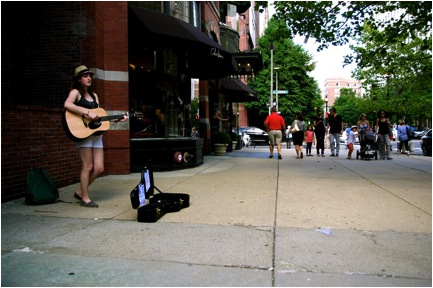
“It’s fun when people come up and they’re like “you’re really good” and give me a tip or I don’t know… It just feels really good.”
I met solo saxophone artist James Kreutzer (Jimmy) playing around the corner from Molly on Boylston Street.
“Sometimes it’s the greatest thing in the world to ever happen” Jimmy says of his busking experiences “It allows me to do nothing but music for my entire life.”
For musicians like Jimmy, Busking is more than just a passing phase, it’s something they’ve done for most of their lives, they love doing it and they are able to make enough of a living to sustain themselves.
Busking is a hugely overlooked art form, from it you can gain exposure, a surprisingly diverse fan base, other paid performance opportunities, paid practice time in front of a live audience, and make enough to live on! As an artist, I never realized how many benefits can be gained from an underrated thing such as street preformance if you really work at it. It is definitely something that every artist should take advantage of especially in Boston where it is free for anyone and everyone.

